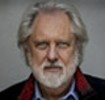Lord Puttnam: the BBC must confront a "total" loss of trust
The film producer and chair of a major inquiry into the future of public service broadcasting calls on the BBC to help rebuild trust in Brexit Britain.
Your inquiry launched its report on the future of public service broadcasting today (Wednesday 29th June) but it was put together in the eight months before Britain voted to leave the EU. Is it as relevant now?
I wrote [the forward to the report] on the 22nd June, the day before the referendum, just in the wake of Jo Cox’s murder – and I wouldn’t change a word. Ironically it feels more powerful because it was written beforehand.
What we all have to recognise is that we are living through an era unique in my experience, where the absence of trust is total – it’s not marginal, it’s total. It’s gone. And the process of rebuilding trust is a very very tough process. It has to be done illustratively … so my argument would be with this government, and indeed it would be with a Labour government if it happened to be in power, is that you have to go out of your way to prove that you do not have your fingerprints in any way shape or form on the provision of public information and news. You’ve got to prove to the public you’re nowhere near it. And any steps you can do that will establish that proof are worth taking.
The report warns of a threat to the BBC’s independence, and includes recommendations on how appointments to the proposed new unitary board can be made to avoid this.
But I was also interested to hear you talk today about the impartiality issue. You made the point that the press was largely anti-European, and in this context perhaps the BBC should have looked at the whole media landscape when determining how to do balanced coverage. Do you think that’s something that needs to be looked at in future?
I do think that needs to be looked at. One of the roles (I’ve actually talked to the BBC since the Brexit vote) one of the things I think they should do – and to an extent they're already doing it – is this business of fact-checking. All of us should be one click away from knowing how accurate a statement we’re reading from a politician, or indeed a newspaper, is. I’ll give you an example. This morning’s headline in The Sun says ‘100 MPs back BoJo’. I don’t think for one moment it’s true … that 100 figure should be challenged by somebody, otherwise it’s purely a promotional assertion. The Advertising Standards Authority wouldn’t be allowed to get away with it. How can a newspaper run a front page that’s not placed through the same strictures as if it were an advertisement?… because that’s what it effectively is – an advertisement for Boris Johnson.
In the long run, the most pernicious of all the charges that were made in this ghastly debate was Michael Gove’s trashing of expertise. That’s the one that will be around for a long time. Because once you start to say to people that economists are rubbish, the next thing is that scientists are rubbish… that becomes the sort of commonality that for example Europe being rubbish was. And the BBC now has the interesting opportunity and obligation to become the supporter of expertise.
There’s a lovely term I’ve always enjoyed, which is ‘vexatious litigant’ – that is someone who compulsively litigates. The BBC has got to get smart about understanding that there are quite a number of vexatious litigants out there. They ought not to be giving them a voice. So I would regard Nigel Lawson’s view on climate change – he is merely a vexatious litigant with a view he’s trying to impose on other people. The BBC, to their credit, and it took a long time, eventually did a report on climate change and agreed that there was to all intents and purposes a scientific consensus, and they could support that consensus while giving some space to other views. It didn’t mean 50/50 any more, it’s more like 90/10.
The BBC needs to get more adroit at understanding it has a responsibility to take positions based on known expertise. Now and then an expert may be wrong. But the idea that we can move forward as a society by trashing experts or academics is a nonsense.
In this post-truth era, which we hope we’re not entering, how can we better regulate the BBC? There has been some criticism of the plan to make Ofcom the regulator. There’s a feeling that Ofcom looks at audiences as consumers, not citizens, and if there’s a need to educate the citizenry, do you think Ofcom needs to change its approach?
I think Ofcom – I had a hand in setting it up, and drawing up its remit – is an organisation I’m very proud of. I do think Ofcom is going to have to become more challenging. One of the big debates while setting up Ofcom was this issue of what its responsibilities were. The people running it at the time wanted it to be a purely commercial organisation. We managed to win, in statute, that its primary responsibility is to the citizen. They have to be reminded of that all the time. They also have a responsibility for training – they’ve never done it … So Ofcom has to take a good long, hard look at its responsibilities, and its principle responsibility is to the citizen.
How can pressure be put on Ofcom to live up to that duty?
Probably the most interesting would be a parliamentary report into Ofcom. Take one of the select committees and look at its performance as against its statutory mandate. Actually, that’s very interesting. I might even suggest it.
Your inquiry feeds into a long process around BBC Charter renewal, with the old BBC Charter expiring at the end of this year. Has Brexit thrown a spanner in the works?
Yes I think it has. I think the emergence of the Brexiteers means one or two of the concessions that [Chancellor] Osborne and [Prime Minister] Cameron managed to get might be off the table… you may find an attempt by [Culture Secretary] Whittingdale and people around him, an attempt to as it were ‘re-review’ the White Paper … they may try to get the Charter Review itself debated and amended but I don’t think so though – I’d like to think it’s gone too far.
You’ve talked about market totalitarianism in the past – isn’t this also about the way in which the media has simultaneously embraced the market but also populism across Europe?
I’ll give you a silly example. The first Prime Minister I dealt with in a formal sense was John Major. I worked with Thatcher a little bit and no one would have ever called Thatcher anything else but Prime Minister to her face. I remember John Major once suggested that we call him John. And someone in the room quite sensibly said ‘no no no, you’re Prime Minister’. That may sound like a silly thing, but when The Sun runs a headline about Bo Jo – do they really realise what they’re doing? This is someone you’re promoting to have extraordinary levels of authority over life and death … This may sound like an old man talking, but it’s quite fundamental.
It’s representative of a culture change.
Yes, a culture change that makes authority and trust almost impossible.
Does this relate to what’s going on with the Labour party, and with criticisms that the BBC was slow to recognise Jeremy Corbyn as the elected leader?
What the BBC were reflecting was a complete bemusement… The Labour Party is a broad church. It needs 16, 18 million voting for it. You can get in on that. Corbyn’s support at the moment is a quarter of a million … That’s 1/20th of the people who voted for the Liberal Democrats in the last election. They got eight seats. Every single Labour MP goes to talk to their constituents. They know, should they go along with that grouping, it’s a wipe out.
Corbyn is quite a special case. He may be entitled to be called the leader of the Labour Party. But he never really has been. He was always a marginal figure – I think the BBC’s assumption was he will remain a marginal figure. Should someone else emerge who clearly was a leader … I think they will be treated very differently. You can’t be somebody who votes against your own government – he holds the world record – and turn around and talk about trust or loyalty. You can’t. It doesn’t make any sense.
Does the report have something to say on this?
The report takes the relationship between broadcast media and democracy very very seriously. And what the report says, and what I say in my forward, is that we’ve managed to create a deeply ignorant society – we’ve been careless – and what happened last week, with the Brexit vote, was people voting out of a combination of fear and ignorance. We allowed a parody, a Monty Python parody of Europe, to become commonplace.
The people we’re likely to end up with at the moment are like the cast of Fright Night… John Redwood? Iain Duncan Smith? These are bizarre creatures. Lawson? Lamont? The two people who have done more damage to the British economy between them than anyone else – if you accept that 2008 was a global collapse. How dare they.
This is about the fragility of democracy. I was talking [at the launch] about Whitelaw [William Whitelaw, then Home Secretary, who negotiated a 15-year BBC Charter in 1981] and this generation that I knew. They’d been in the war. They knew what a close-run thing the war was. We don’t have these people anymore. You’ve heard it [when you talk about] the notion of a European war – you’re laughed at.
Read the full report here
Source: Opendemocracy





